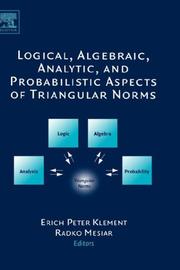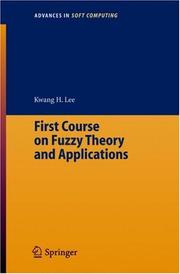| Listing 1 - 5 of 5 |
Sort by
|

ISBN: 1280633972 9786610633975 0080459536 0444518142 Year: 2005 Publisher: Boston : Elsevier,
Abstract | Keywords | Export | Availability | Bookmark
 Loading...
Loading...Choose an application
- Reference Manager
- EndNote
- RefWorks (Direct export to RefWorks)
This volume gives a state of the art of triangular norms which can be used for the generalization of several mathematical concepts, such as conjunction, metric, measure, etc. 16 chapters written by leading experts provide a state of the art overview of theory and applications of triangular norms and related operators in fuzzy logic, measure theory, probability theory, and probabilistic metric spaces.Key Features:- Complete state of the art of the importance of triangular norms in various mathematical fields- 16 self-contained chapters with extensive bibliographies cover bot
Fuzzy sets. --- Set theory. --- Aggregates --- Classes (Mathematics) --- Ensembles (Mathematics) --- Mathematical sets --- Sets (Mathematics) --- Theory of sets --- Logic, Symbolic and mathematical --- Mathematics --- Sets, Fuzzy --- Fuzzy mathematics --- Set theory
Book
ISBN: 1280427213 9786610427215 3540268863 Year: 2005 Publisher: Berlin, Heidelberg : Springer Berlin Heidelberg : Imprint: Springer,
Abstract | Keywords | Export | Availability | Bookmark
 Loading...
Loading...Choose an application
- Reference Manager
- EndNote
- RefWorks (Direct export to RefWorks)
Over recent years, interest in using fuzzy sets approaches has grown across fields that use spatial information in geographic problems. Not only has there been considerable research on fuzzy sets in GIS that support geographic problem solving, but increasingly the uncertainties inherent in modeling geographic problems are addressed using soft-computing methods. This book focuses on research advances in approaches for incorporating explicit handling of uncertainty, especially by fuzzy sets, to address geographic problems. It has two aims: to stimulate research in the theory and application of fuzzy sets to spatial information management and geographic problem solving; and to highlight advances that have matured so much that geoscientists, computer scientists, geographers, et al. use fuzzy modeling. The book includes examples of the use of fuzzy sets in representational issues such as terrain features, landscape morphology, spatial extents and approaches for spatial interpolation, plus applications using fuzzy sets covering data mining, spatial decision making, ecological simulation, and reliability in GIS.
Fuzzy sets. --- Decision making --- Geographic information systems --- Mathematical models. --- Sets, Fuzzy --- Fuzzy mathematics --- Set theory --- Geographical information systems --- GIS (Information systems) --- Information storage and retrieval systems --- Geography --- Geographical information systems. --- Logic, Symbolic and mathematical. --- Geography. --- Physical geography. --- Artificial intelligence. --- Geographical Information Systems/Cartography. --- Mathematical Logic and Foundations. --- Discrete Mathematics. --- Earth Sciences, general. --- Geophysics/Geodesy. --- Artificial Intelligence. --- AI (Artificial intelligence) --- Artificial thinking --- Electronic brains --- Intellectronics --- Intelligence, Artificial --- Intelligent machines --- Machine intelligence --- Thinking, Artificial --- Bionics --- Cognitive science --- Digital computer simulation --- Electronic data processing --- Logic machines --- Machine theory --- Self-organizing systems --- Simulation methods --- Fifth generation computers --- Neural computers --- Cosmography --- Earth sciences --- World history --- Algebra of logic --- Logic, Universal --- Mathematical logic --- Symbolic and mathematical logic --- Symbolic logic --- Mathematics --- Algebra, Abstract --- Metamathematics --- Syllogism --- Mathematical logic. --- Discrete mathematics. --- Earth sciences. --- Geophysics. --- Geological physics --- Terrestrial physics --- Physics --- Geosciences --- Environmental sciences --- Physical sciences --- Discrete mathematical structures --- Mathematical structures, Discrete --- Structures, Discrete mathematical --- Numerical analysis

ISBN: 9783540250722 3540250727 3540323953 Year: 2005 Publisher: Berlin, Heidelberg : Springer Berlin Heidelberg : Imprint: Springer,
Abstract | Keywords | Export | Availability | Bookmark
 Loading...
Loading...Choose an application
- Reference Manager
- EndNote
- RefWorks (Direct export to RefWorks)
This book presents an up-to-date account of research in important topics of fuzzy group theory. The book concentrates on the theoretical aspects of fuzzy subgroups of a group. It also includes applications to some abstract recognition problems and to coding theory. The book begins with basic properties of fuzzy subgroups. The notions of ascending series and descending series of fuzzy subgroups are used to define nilpotency of a fuzzy subgroup. Fuzzy subgroups of Hamiltonian, solvable, P-Hall, and nilpotent groups are discussed. Construction of free fuzzy subgroups is determined. Numerical invariants of fuzzy subgroups of Abelian groups are developed. The problem in group theory of obtaining conditions under which a group can be expressed as a direct product of its normal subgroups is considered. The number of fuzzy subgroups (up to an equivalence relation) of certain finite Abelian groups is determined. Methods for deriving fuzzy theorems from crisp ones are presented and the embedding of lattices of fuzzy subgroups into lattices of crisp groups is discussed. Deriving membership functions from similarity relations is considered. The material presented in this book makes it a good reference for graduate students and researchers working in fuzzy group theory.
Fuzzy sets. --- Group theory. --- Ensembles flous --- Groupes, Théorie des --- Engineering. --- Artificial intelligence. --- Systems and Information Theory in Engineering. --- Artificial Intelligence (incl. Robotics). --- Group Theory and Generalizations. --- Fuzzy sets --- Computer Science --- Algebra --- Engineering & Applied Sciences --- Mathematics --- Physical Sciences & Mathematics --- Théorie des groupes --- Sets, Fuzzy --- Groups, Theory of --- Substitutions (Mathematics) --- AI (Artificial intelligence) --- Artificial thinking --- Electronic brains --- Intellectronics --- Intelligence, Artificial --- Intelligent machines --- Machine intelligence --- Thinking, Artificial --- Construction --- Computer science. --- Computers. --- Complexity, Computational. --- Computer Science. --- Theory of Computation. --- Complexity. --- Information theory. --- Artificial Intelligence. --- Industrial arts --- Technology --- Communication theory --- Communication --- Cybernetics --- Bionics --- Cognitive science --- Digital computer simulation --- Electronic data processing --- Logic machines --- Machine theory --- Self-organizing systems --- Simulation methods --- Fifth generation computers --- Neural computers --- Computational complexity. --- Complexity, Computational --- Automatic computers --- Automatic data processors --- Computer hardware --- Computing machines (Computers) --- Electronic calculating-machines --- Electronic computers --- Hardware, Computer --- Computer systems --- Calculators --- Cyberspace

ISBN: 9783540237297 3540237291 9786610610358 1280610352 3540323716 Year: 2005 Publisher: Berlin, Germany ; New York, New York : Springer,
Abstract | Keywords | Export | Availability | Bookmark
 Loading...
Loading...Choose an application
- Reference Manager
- EndNote
- RefWorks (Direct export to RefWorks)
This book presents a systematic and focused study of the application of fuzzy sets to two basic areas of decision theory, namely Mathematical Programming and Matrix Game Theory. Apart from presenting most of the basic results available in the literature on these topics, the emphasis is on understanding their natural relationship in a fuzzy environment. The study of duality theory for fuzzy mathematical programming problems plays a key role in understanding this interrelationship. For this, a theoretical framework of duality in fuzzy mathematical programming and conceptualization of the solution of a fuzzy game is created on the lines of their crisp counterparts. Most of the theoretical results and associated algorithms are illustrated through small numerical examples from actual applications.
Game theory. --- Fuzzy sets. --- Programming (Mathematics) --- Théorie des jeux --- Ensembles flous --- Programmation (Mathématiques) --- Engineering. --- Artificial intelligence. --- Mathematics. --- Computer science --- Operations research. --- Engineering mathematics. --- Appl.Mathematics/Computational Methods of Engineering. --- Game Theory, Economics, Social and Behav. Sciences. --- Artificial Intelligence (incl. Robotics). --- Operations Research/Decision Theory. --- Computational Mathematics and Numerical Analysis. --- Operations Research, Mathematical Programming. --- Game theory --- Fuzzy sets --- Civil & Environmental Engineering --- Mathematics --- Engineering & Applied Sciences --- Physical Sciences & Mathematics --- Civil Engineering --- Algebra --- Applied Mathematics --- Mathematical programming --- Goal programming --- Sets, Fuzzy --- Games, Theory of --- Theory of games --- Decision making. --- Computer mathematics. --- Discrete mathematics. --- Applied mathematics. --- Discrete Mathematics. --- Operation Research/Decision Theory. --- Mathematical models --- Algorithms --- Functional equations --- Mathematical optimization --- Operations research --- Fuzzy mathematics --- Set theory --- Mathematical and Computational Engineering. --- Artificial Intelligence. --- Computer mathematics --- Discrete mathematics --- Electronic data processing --- Operational analysis --- Operational research --- Industrial engineering --- Management science --- Research --- System theory --- AI (Artificial intelligence) --- Artificial thinking --- Electronic brains --- Intellectronics --- Intelligence, Artificial --- Intelligent machines --- Machine intelligence --- Thinking, Artificial --- Bionics --- Cognitive science --- Digital computer simulation --- Logic machines --- Machine theory --- Self-organizing systems --- Simulation methods --- Fifth generation computers --- Neural computers --- Math --- Science --- Engineering --- Engineering analysis --- Mathematical analysis --- Deciding --- Decision (Psychology) --- Decision analysis --- Decision processes --- Making decisions --- Management --- Management decisions --- Choice (Psychology) --- Problem solving --- Discrete mathematical structures --- Mathematical structures, Discrete --- Structures, Discrete mathematical --- Numerical analysis --- Decision making

ISBN: 9783540229889 3540229884 354032366X Year: 2005 Publisher: Berlin, Heidelberg : Springer Berlin Heidelberg : Imprint: Springer,
Abstract | Keywords | Export | Availability | Bookmark
 Loading...
Loading...Choose an application
- Reference Manager
- EndNote
- RefWorks (Direct export to RefWorks)
This basic textbook gives an easily accessible introduction to Fuzzy theory and its applications. It provides basic and concrete concepts of the field in a self-contained, condensed and understandable style. This "First Course on Fuzzy Theory and Applications" includes numerous examples, descriptive illustrations and figures of the basic concepts, as well as exercises at the end of each chapter. The author has long time experience in teaching on fuzzy theory and its applications and continuously developed and summarized his didactic lecture notes into this book. This book can be used in introductory graduate and undergraduate courses in Fuzziness and Soft Computing and is recommendable to students, scientists, engineers, or professionals in the field for self-study.
Fuzzy sets. --- Fuzzy logic. --- Fuzzy systems. --- Ensembles flous --- Logique floue --- Systèmes flous --- Fuzzy sets --- Fuzzy logic --- Fuzzy systems --- Algebra --- Applied Mathematics --- Civil Engineering --- Engineering & Applied Sciences --- Civil & Environmental Engineering --- Mathematics --- Physical Sciences & Mathematics --- Systems, Fuzzy --- Nonlinear logic --- Sets, Fuzzy --- Computer science. --- Artificial intelligence. --- Applied mathematics. --- Engineering mathematics. --- Probabilities. --- Vibration. --- Dynamical systems. --- Dynamics. --- Computer Science. --- Artificial Intelligence (incl. Robotics). --- Appl.Mathematics/Computational Methods of Engineering. --- Vibration, Dynamical Systems, Control. --- Applications of Mathematics. --- Probability Theory and Stochastic Processes. --- Dynamical systems --- Kinetics --- Mechanics, Analytic --- Force and energy --- Mechanics --- Physics --- Statics --- Cycles --- Sound --- Probability --- Statistical inference --- Combinations --- Chance --- Least squares --- Mathematical statistics --- Risk --- Engineering --- Engineering analysis --- Mathematical analysis --- AI (Artificial intelligence) --- Artificial thinking --- Electronic brains --- Intellectronics --- Intelligence, Artificial --- Intelligent machines --- Machine intelligence --- Thinking, Artificial --- Bionics --- Cognitive science --- Digital computer simulation --- Electronic data processing --- Logic machines --- Machine theory --- Self-organizing systems --- Simulation methods --- Fifth generation computers --- Neural computers --- Informatics --- Science --- System analysis --- Fuzzy mathematics --- Logic, Symbolic and mathematical --- Set theory --- Mathematics. --- Distribution (Probability theory. --- Artificial Intelligence. --- Mathematical and Computational Engineering. --- Math --- Distribution functions --- Frequency distribution --- Characteristic functions --- Probabilities
| Listing 1 - 5 of 5 |
Sort by
|

 Search
Search Feedback
Feedback About
About Help
Help News
News